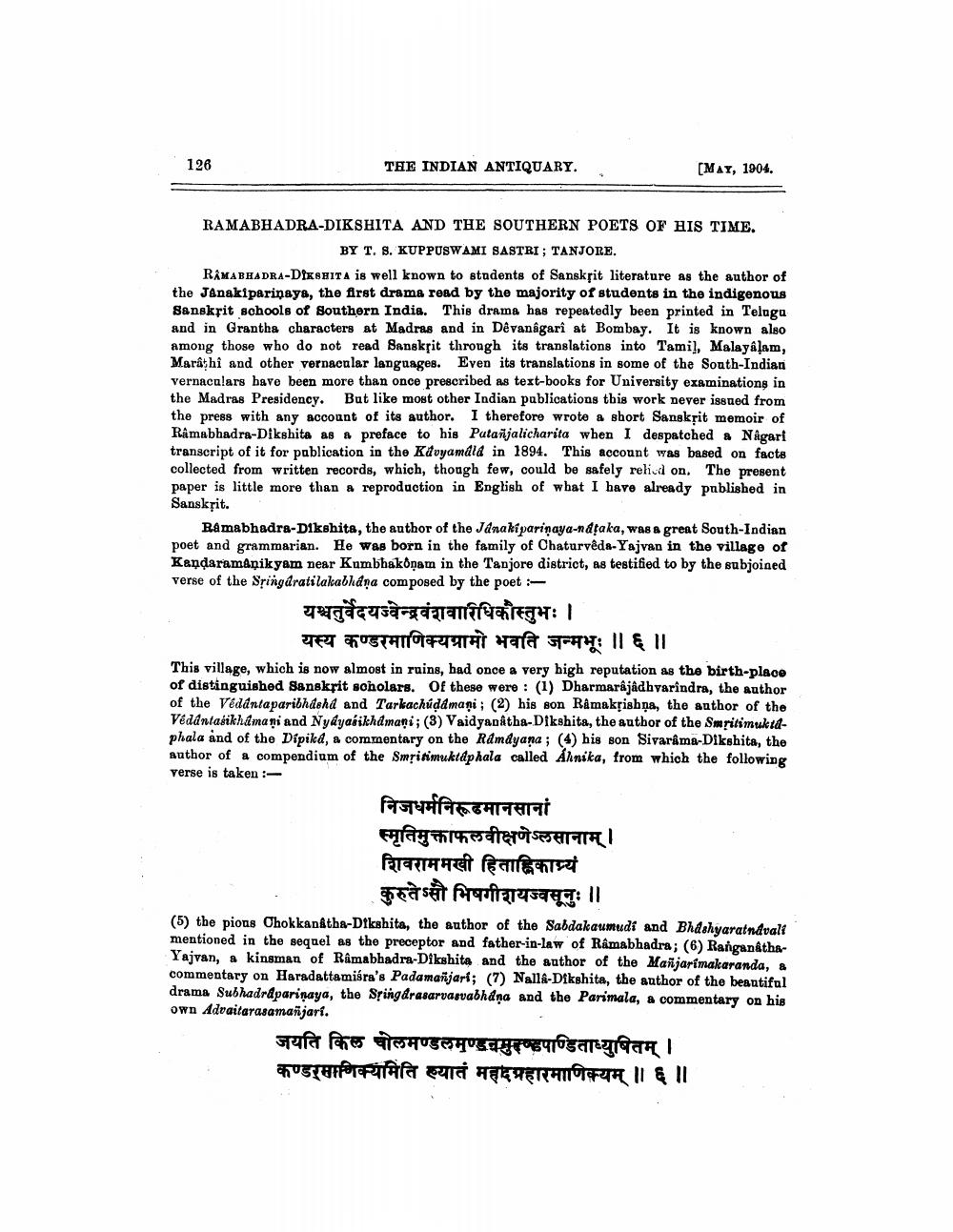________________
126
THE INDIAN ANTIQUARY.
(MAY, 1904.
RAMABHADRA-DIKSHITA AND THE SOUTHERN POETS OF HIS TIME.
BY T. S. KUPPUSWAMI SASTRI ; TANJORE. RAMABHADRA-DIKSHITA is well known to students of Sanskrit literature as the author of the Janakiparinays, the first drama read by the majority of students in the indigenous Sanskrit schools of Southern India. This drama has repeatedly been printed in Telugu and in Grantha characters at Madras and in Devanagari at Bombay. It is known also among those who do not read Sanskrit through its translations into Tamil, Malayalam, Marathi and other vernacular languages. Even its translations in some of the South-Indian vernaculars have been more than once prescribed as text-books for University examinations in the Madras Presidency. But like most other Indian publications this work never issued from the press with any account of its author. I therefore wrote a short Sansksit memoir of Ramabhadra-Dikshita as a preface to his Patanjalicharita when I despatched a Nagari transcript of it for publication in the Kdvyamdld in 1894. This account was based on facts collected from written records, which, though few, could be safely rehad on. The present paper is little more than a reproduction in English of what I have already published in Sanskrit.
Ramabhadra-Dikshita, the author of the Janaki parinaya-ndtaka, was a great South-Indian poet and grammarian. He was born in the family of Chaturveda-Yajvan in the village of Kandaramanikyam near Kumbhakonam in the Tanjore district, as testified to by the subjoined verse of the Spingdratilakabhdna composed by the poet :
यश्चतुर्वेदयज्वेन्द्रवंशवारिधिकौस्तुभः ।
यस्य कण्डरमाणिक्यग्रामो भवति जन्मभूः ॥६॥ This village, which is now almost in ruins, had once a very high reputation as the birth-place of distinguished Sanskrit scholars. Of these were: (1) Dharmarajadhvarindra, the author of the Vedantaparibhasha and Tarkachúddmani; (2) his son Råmaksishna, the anthor of the Védántasikhamani and Nyayabikhdmani; (3) Vaidyanatha-Dikshita, the author of the Smritimuktdphala and of the Dipikd, a commentary on the Ramayana ; (4) his son Sivarama-Dikshita, the author of a compendium of the Smritimukt&phala called Áhnika, from which the following verse is taken:
निजधर्मनिरूढमानसानां स्मृतिमुक्ताफलवीक्षणेऽलसानाम् । शिवराममखी हिताहिकान्य
कुरुतेऽसौ भिषगीशयज्वसूनुः ॥ (5) the pions Chokkantha-Dikshita, the author of the Sabdakaumudi and Bhashyaratndvali mentioned in the sequel as the preceptor and father-in-law of Ramabhadra; (6) RanganathaYajvan, a kinsman of Ramabhadra-Dikshita and the author of the Manjarimakaranda, a commentary on Haradattamisra's Padamañjari; (7) Nallf-Dikshita, the author of the beautiful drama Subhadraparinaya, the Sringdrasarvasvabhdņa and the Parimala, a commentary on his own Advaitarasamañarí.
जयति किल चोलमण्डलमण्डनमुण्डपाण्डिताध्युषितम् । कण्डरमाणिक्यमिति ख्यातं महादग्रहारमाणिक्यम् ॥ ६॥




